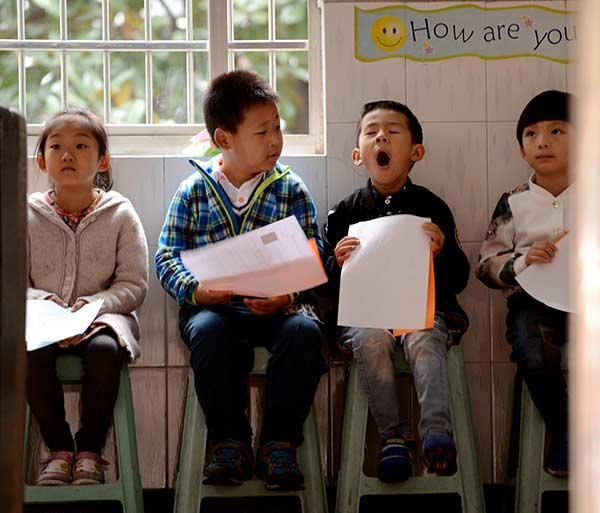Private schooling may go nonprofit
 |
|
Children wait for interviews to enroll in the private Changjiang Experimental Primary School in Hangzhou, Zhejiang province, last year.Dong Xuming / For China Daily |
The central government will need to provide financial support to private schools if a revised law banning them from making a profit is passed, state legislators said on Tuesday.
A draft amendment to the law on private education aims to block schools from profiting from tuition fees for children eligible to receive the country's nine years of compulsory education.
The rule change would mean schools that cater to the children of migrant workers and those from wealthy families would need to be entirely nonprofit enterprises, which some fear could lead to closures.
"I hope the government can provide necessary guidance to ensure private schools, particularly ones with good educational resources that have produced a number of talented students, can keep developing and making a contribution" to the education system, Zhou Tianhong, a member of the National People's Congress Standing Committee, said in a session to discuss the draft on Tuesday.
He added that local authorities should also help schools for migrant workers' children to become nonprofit, as they have played a key role in implementing compulsory education and equal access to education nationwide.
"The government could provide funds to these schools and take the costs of the schools into consideration when making the annual budget," he said.
According to data from the Ministry of Education, about 10,000 private schools enrolled more than 12 million students of compulsory education age last year.
The draft amendment was drawn up to comply with the Law on Compulsory Education, which states that education from Grades 1 to 9, usually ages 6 to 15, should be supported by government funds and free of charge for families, added Wu Heng, another committee member.
Xiong Bingqi, deputy director of the 21st Century Education Research Institute, said a ban on making a profit is understandable considering the unbalanced development of compulsory education nationwide.
"For profit private schools can focus on other educational phases, such as kindergarten, high school or higher education, to make a profit," he said.
The amendment is due to be passed on Nov 7 and will likely come into effect in September, which means the schools affected will have less than a year to make the necessary changes.
The effect on private schools for children from wealthy families is still unclear.
A report on China's international schools, released in December, showed there were 256 so-called international schools as of last year.
Contact the writers at zhaoxinying@chinadaily.com.cn
- Is it a thing? 10 odd jobs where you can make good money
- Message on a bottle: Mineral water company launches drive to find missing children
- Sun Yat-sen champion of national integrity, unity: Xi
- Four killed, two injured after house collapses in C China
- Cross-Straits forum held to commemorate Sun Yat-sen

















